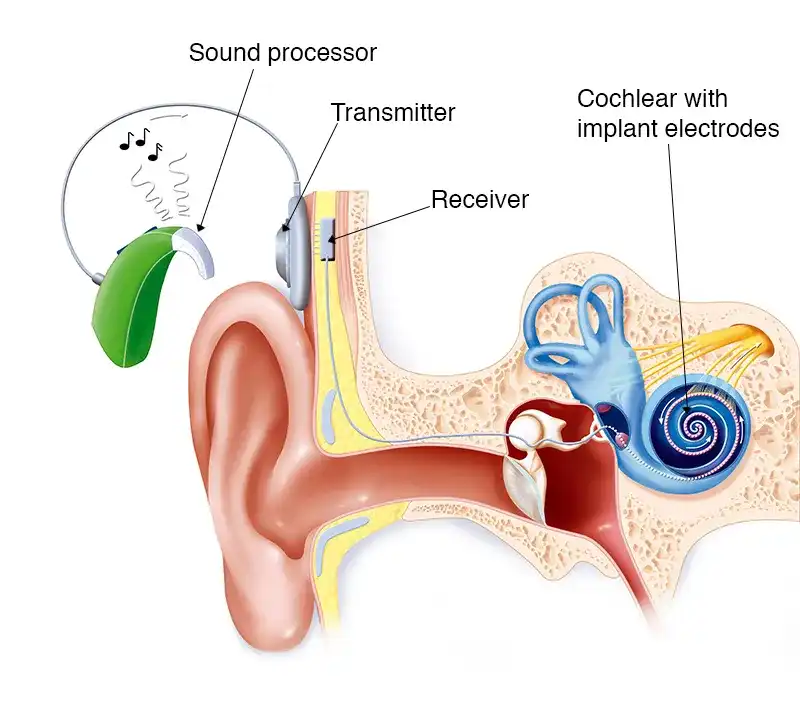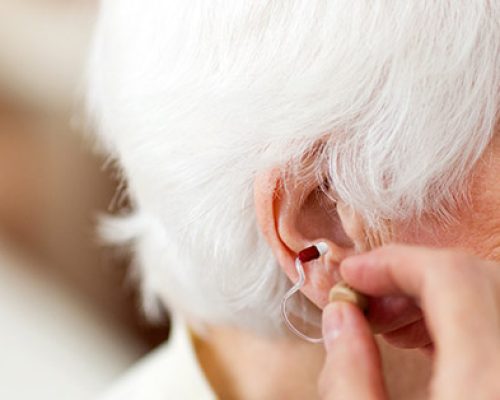What are hearing aids?
Hearing aids are small electronic devices designed to enhance hearing for individuals experiencing hearing loss. These devices are typically worn either behind the ear or inside the ear canal, functioning by amplifying sounds to make them louder and more audible. This amplification helps people with hearing impairments engage more effectively in conversations and everyday activities.
It’s essential to recognize that hearing aids do not fully restore natural hearing or serve as a cure for hearing loss. Instead, they act as supportive tools to manage the condition.hearing aids could offer a practical solution to improve your hearing experience.
hearing aids Advantages

Rechargeable
Our extensive range of rechargeable hearing aids designed for convenience and longevity.

Waterproof
Engineered to withstand moisture, these devices can handle sweat, splashes, and even submersion.

Apps
Mobile applications that enhance your hearing experience, making it simpler and more enjoyable.

Accessories
Find a variety of accessories including headphones, hearing protection, and much more to your hearing aids.
Ttypes of hearing aids
No posts found!
How Do Hearing Aids Work?
Hearing aids are intricate devices designed to enhance sound perception by utilizing various components that collaborate seamlessly. While the exact configuration may differ depending on the model, the fundamental elements of a hearing aid and their functions are as follows:
- Sound enters the device through a series of microphones.
- These microphones transform the incoming sound waves into electrical signals, which are then processed before being relayed to an amplifier.
- The amplifier’s role is to increase the volume of these signals, effectively augmenting the sound.
- Finally, the amplified sounds are delivered to your ear via a miniature speaker, known as a receiver.
Many hearing aids are powered by replaceable batteries, but a growing number utilize rechargeable batteries. This allows you to charge your hearing aids similarly to how you would charge a smartphone.


Advantages of Hearing Aids
Hearing aids come in different shapes and sizes, but they serve much the same function. These devices are equipped with microphones that capture environmental sounds. A processing chip then digitally processes these sounds, amplifies them and transmits them directly to your ears.
The advantages of using hearing aids include:
- Enhancing the clarity of weak sounds
- Making noisy environments easier to control
- Making conversations easier
- Improving your hearing during conversations
- Helping you to hear better in noisy environments
How can I care for my hearing aid?
Protect from Heat and Moisture: Always store your hearing aids in a cool, dry place. Avoid exposing them to excessive heat or humidity, which can negatively impact their functionality.
Regular Cleaning: Follow the cleaning guidelines provided by your audiologist or manufacturer. It’s important to remove earwax and any moisture, as these can lead to significant damage over time.
Avoid Hair Products: Steer clear of applying hairspray or any other hair care items while wearing your hearing aids. These substances can clog the devices and hinder their performance.
Power Down When Not in Use: Make it a habit to turn off your hearing aids when you’re not wearing them. This helps conserve battery life and protects the internal components.
Immediate Battery Replacement: If you notice your hearing aid isn’t functioning properly, check the batteries and replace them right away. Dead batteries can prevent your device from operating effectively.
Safety First: Store spare batteries and small hearing aid components out of reach of children and pets to prevent any accidents or ingestion.

hearing aid: Addressing Common Queries
How long do hearing aids usually last?
Hearing aids usually last between 3 and 7 years, depending on how well you take care of them – things like keeping them dry and storing them properly can really extend their life.
Do hearing aids need regular maintenance?
Yes, cleaning your hearing aids is essential to prevent earwax buildup and ensure clear sound quality. Many audiologists recommend a quick wipe with a soft cloth every day to keep your hearing aids running smoothly and avoid common problems such as muffled sound.
Are hearing aids suitable for everyday use?
Absolutely, they are rigorously tested to meet safety standards and are usually comfortable for most wearers. From personal experiences I’ve heard, hearing aid users are usually more confident in social situations and don’t have major health problems when worn correctly.
What causes hearing aids to whine?
This annoying feedback usually stems from a leakage of sound and is usually caused by uncomfortable wearing or clogged earwax. Adjusting or cleaning your headphones can quickly mute them and make listening more comfortable.
Can I wear my hearing aids while exercising?
Yes, many modern models are sweat-proof and designed for exercise, so you can jog or go to the gym without worrying. Simply fasten them in place.
Should I sleep with my hearing aids?
No. It’s best to remove them at night to prevent discomfort and potential damage and to allow your ears to rest. Most users I’ve talked to agree that this habit helps extend the life of your hearing aids and prevents battery drain.










